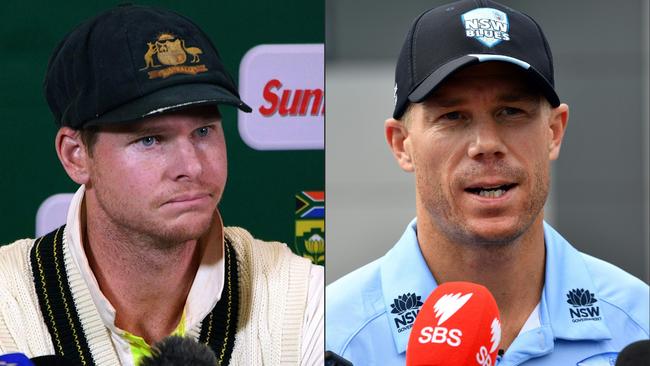How many change agents does it take to change a light bulb?
Here again is confirmation of the truism that it is only ever athletes who are penalised for sporting maladministration.

This coincided with the development of a “players’ pact” whose contributors included Tim Paine, Pat Cummins and Justin Langer.
We now know that for at least part of that time, the CA board was also handling, after its own inimitable fashion, a sexual/textual harassment complaint against Paine, and deciding against further action — for the next three and a half years anyway, when it was about to be divulged in a newspaper.
As though suffering a flashback to Sandpapergate, the board then not only cut Paine adrift, but, in an act of ritual self-abasement, basically said that he should never have been confirmed in the position in the first place.
So brilliantly has this played out, to the extent that Paine has now elected to take an “indefinite break” from the game, it is being seriously argued that an independent review is needed, which would be tantamount to a full enquiry into the last full enquiry.
To paraphrase the old joke about therapists, how many cultural change agents does it take to change a light bulb? None. The light bulb has to want to change.
The irony of this latest hot mess is that the public does not seem overly fussed — not nearly so monolithic in its attitudes as post-Sandpapergate.
A wide variety of thoughtful opinion, some of it in these pages, has been aired. The public pillory of Twitter has been interestingly muted.


So much for the second-most important job in Australia, eh? Cricket can surely now cede this mantle to that epitome of grace, decorum and fidelity, Barnaby Joyce.
That public ambivalence is partly, I think, because of the passage of time matters. There really seem two issues at stake: the fact of the conduct and the proportionality of the response.
Even Paine’s admirers must allow that his actions, their consensuality notwithstanding, were reckless and boorish, and arguably characteristic of Australian cricket at the time.
There are some passages in the Ethics Centre review that a more capable chairman than Richard Freudenstein might have deployed to his advantage at last Saturday’s press conference.
Of its interviews with CA staff, the centre reported in October 2018: “People often spoke about elite male players operating in a ‘bubble’ that neither invests in nor values emotional maturity …
“People spoke about a fear of reporting ethical behaviour that was not aligned with CA’s ethical framework.
“Some responses referred to severe consequences for ‘calling out’ inappropriate behaviour, with some responses detailing aggressive tactics from CA management in response to reports of grievance over operations that did not respect ‘fair play’.”

Alas, Freudenstein was so determined to minimise his knowledge of events before joining the board in 2019 that all he could offer a week ago was incoherent waffle.
This raises the question of the legitimacy of the CA board’s reaching back to a period before Paine became captain to retrospectively judge him unfit for the role.
Some have likened the affair to that of the 1995 cover-up of what became the 1999 controversy around the relations with a bookmaker of Mark Waugh and Shane Warne.
The likeness is inexact. In 1995, Waugh and Warne were both penalised for their indiscretions. It was precisely these penalties that were hushed up, for reasons of squeamishness about the pair having earlier publicly accused Pakistan’s Salim Malik of malpractice.
To summarise again: after becoming Test captain, Paine was accused of an act from well before he was Test captain, at a time when he would have felt himself a million miles removed from a leadership position, and was probably enjoying some of the euphoria and sense of impunity accompanying a return to the Test team after seven years.
At the end of an integrity process, the board, rightly or wrongly, took no action. There was, in that sense, nothing to report.
Having co-operated fully in said process, Paine was entitled to feel that the matter had been resolved. He seems to have taken this experience the right way — not as a licence to misbehave again but as a timely caution and an incentive to attend to his marriage. He discharged his responsibilities ably, and in a dignified manner.

Yet the board did not merely oust Paine. They effectively said he should never have had the job. Why? Basically because he was unable to go back and change the past. He has been penalised, then, for not being Marty McFly.
Let’s grant CA directors their good intentions in an awkward situation. But here, again, is confirmation of the truism that it is only ever athletes who are penalised for sporting maladministration.
After all, now that Paine’s act has been deemed retroactively reprehensible and the board at the time to have failed, why have the directors involved in the original decision, John Harnden and Michelle Tredenick, not resigned?
Let’s throw in Paul Green for good measure. He was then the deputy chairman of Cricket Tasmania, which also investigated the complaint and did not uphold it.
If we’re to make abjection complete, too, why stop there?
Should CA not have issued a grovelling apology to the complainant? Should it not now be actively seeking out other earlier failures to atone for?
Back in the day, for example, CA hoovered up sponsorship millions from a tobacco company whose products killed thousands of people, and from a bank who ripped off almost as many?
How heinous was that laundering of degraded corporate reputations? If we’re serious about redress, let’s have a reckoning with the whole past, not just the past that’s subject to tabloid expose.
Or maybe the board could just read that Ethics Centre report again. Assuming they read it the first time.
“In the relentless pursuit of excellent cricketers,” the report concluded, “CA appears to have failed to introduce measures to help their people become excellent leaders and decision makers.”
Three years on, it feels like the only measure CA has introduced is periodically sacking the captain.






Between May and August 2018, Cricket Australia submitted to an independent study of its purpose, values and principles by Sydney’s Ethics Centre, which resulted in a dense report containing 42 recommendations to “restore faith and prompt change”.